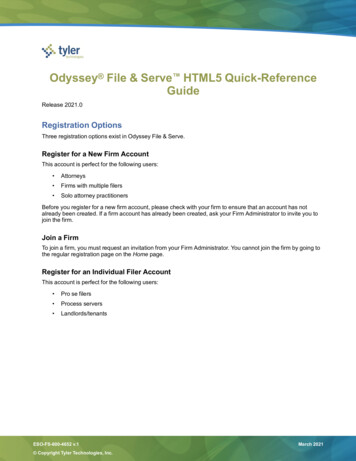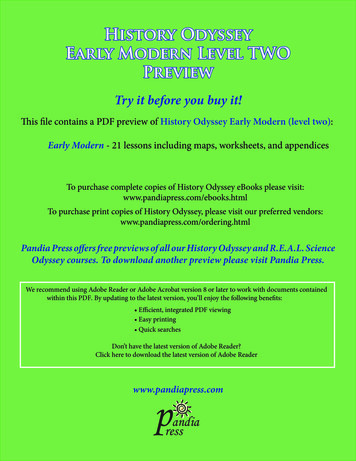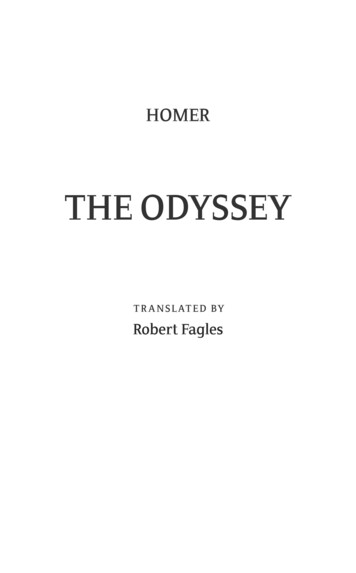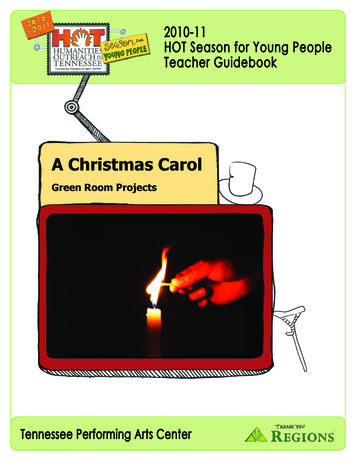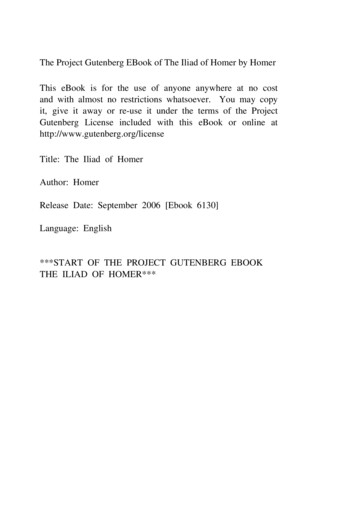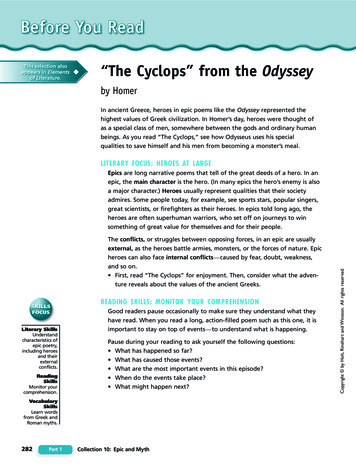
Transcription
“The Cyclops” from the Odysseyby HomerIn ancient Greece, heroes in epic poems like the Odyssey represented thehighest values of Greek civilization. In Homer’s day, heroes were thought ofas a special class of men, somewhere between the gods and ordinary humanbeings. As you read “The Cyclops,” see how Odysseus uses his specialqualities to save himself and his men from becoming a monster’s meal.LITERARY FOCUS: HEROES AT LARGEThe conflicts, or struggles between opposing forces, in an epic are usuallyexternal, as the heroes battle armies, monsters, or the forces of nature. Epicheroes can also face internal conflicts—caused by fear, doubt, weakness,and so on. First, read “The Cyclops” for enjoyment. Then, consider what the adventure reveals about the values of the ancient Greeks.READING SKILLS: MONITOR YOUR COMPREHENSIONLiterary SkillsUnderstandcharacteristics ofepic poetry,including heroesand theirexternalconflicts.ReadingSkillsMonitor yourcomprehension.Good readers pause occasionally to make sure they understand what theyhave read. When you read a long, action-filled poem such as this one, it isimportant to stay on top of events—to understand what is happening.Pause during your reading to ask yourself the following questions: What has happened so far? What has caused those events? What are the most important events in this episode? When do the events take place? What might happen next?VocabularySkillsLearn wordsfrom Greek andRoman myths.282Part 1Collection 10: Epic and MythCopyright by Holt, Rinehart and Winston. All rights reserved.Epics are long narrative poems that tell of the great deeds of a hero. In anepic, the main character is the hero. (In many epics the hero’s enemy is alsoa major character.) Heroes usually represent qualities that their societyadmires. Some people today, for example, see sports stars, popular singers,great scientists, or firefighters as their heroes. In epics told long ago, theheroes are often superhuman warriors, who set off on journeys to winsomething of great value for themselves and for their people.
PREVIEW SELECTION VOCABULARYThe following words appear in “The Cyclops.” Become familiar with thembefore you begin reading.ravage (rav ij) v.: destroy violently; ruin.The Cyclops planned to ravage Odysseus and hismen by eating them.adversary (ad v r·ser ) n.: enemy; opponent.Odysseus had to find a way to defeat hisadversary, the Cyclops.profusion (pr ·fyº n) n.: large supply;abundance.With such a large flock of sheep, the Cyclops hada profusion of milk, cheese, and wool.WORDS FROM GREEK AND ROMAN MYTHSCopyright by Holt, Rinehart and Winston. All rights reserved.Many words we use in English today come from Greek and Roman myths. Forexample, a journey or quest is often called an odyssey, named for the Odyssey,the epic poem from which “The Cyclops” is taken. Other words from “TheCyclops” that have been handed down are ambrosia, meaning “food of thegods,” and nectar, meaning “drink of the gods.” Look at the chart below tolearn of other words handed down from Greek and Roman myths.Names from Greek and Roman MythsEnglish WordsCeres, Roman goddess of agriculture and fertilitycerealMount Olympus, legendary home of gods andgoddessesOlympicsTantalus, character from Greek myth whosefood and drink were kept just out of his reach,as punishmenttantalizeTitans, race of giant Greek gods and goddesseswho came before the OlympianstitanicVulcan, Roman god of fire and metalworkersvolcanoThe Cyclops283
NotesHomerRijksmuseum Kroller-Muller, Otterlo, the Netherlands.Bridgeman Art Library.translated by Robert FitzgeraldThe Odyssey is the story of the attempt of a Greek soldier, Odysseus,to return to his home following the Trojan War. An epic, theOdyssey is composed of many different stories, or episodes, inwhich the hero, Odysseus, faces all sorts of challenges.In this adventure, Odysseus describes his encounter with theCyclops, Polyphemus (päl i·f m s), Poseidon’s one-eyed monsterson. Polyphemus may represent the brute forces that any hero mustovercome before he can reach home. To survive, Odysseus must relyon the special intelligence associated with his name. Odysseus is thecleverest of the Greek heroes because he is guided by the goddess ofwisdom, Athena.It is Odysseus’s famed curiosity that leads him to the Cyclops’scave and that makes him insist on waiting for the barbaric giant.From The Odyssey by Homer, translated byRobert Fitzgerald. Copyright 1961, 1963 byRobert Fitzgerald; copyright renewed 1989by Benedict R. C. Fitzgerald. Reprinted bypermission of Farrar, Straus & Giroux, LLC.284Part 1Collection 10: Epic and MythOdysseus is speaking to the court of King Alcinous (al·sin · s).Copyright by Holt, Rinehart and Winston. All rights reserved.The Cyclops (detail) (late 19th or early 20th century) by Odilon Redon.
“We lit a fire, burnt an offering,and took some cheese to eat; then sat in silencearound the embers, waiting. When he camehe had a load of dry boughs on his shoulder5to stoke his fire at suppertime. He dumped itwith a great crash into that hollow cave,Pause at line 3. Odysseus andhis men are in the cave ofthe Cyclops, Polyphemus. Towhom do the men burn anoffering?and we all scattered fast to the far wall.Then over the broad cavern floor he usheredthe ewes he meant to milk. He left his rams10and he-goats in the yard outside, and swunghigh overhead a slab of solid rockto close the cave. Two dozen four-wheeled wagons,with heaving wagon teams, could not have stirredthe tonnage of that rock from where he wedged it15over the doorsill. Next he took his seatand milked his bleating ewes. A practiced jobWho is the “he” in line 3?he made of it, giving each ewe her suckling;thickened his milk, then, into curds and whey,sieved out the curds to drip in withy baskets,120and poured the whey to stand in bowlsCopyright by Holt, Rinehart and Winston. All rights reserved.cooling until he drank it for his supper.When all these chores were done, he poked the fire,heaping on brushwood. In the glare he saw us.‘Strangers,’ he said, ‘who are you? And where from?25What brings you here by seaways—a fair traffic?Re-read lines 5-23, and payattention to the Cyclops’sactions. What qualities doeshe have?Or are you wandering rogues, who cast your liveslike dice, and ravage other folk by sea?’We felt a pressure on our hearts, in dreadof that deep rumble and that mighty man.30But all the same I spoke up in reply:‘We are from Troy, Achaeans, blown off courseby shifting gales on the Great South Sea;1.ravage (rav ij) v.: destroyviolently; ruin.withy baskets: baskets made from willow twigs.The Cyclops285
homeward bound, but taking routes and waysuncommon; so the will of Zeus would have it.Hospitality to strangers wasextremely important to theancient Greeks. Re-read lines38-43, and underline thewords that tell what willhappen if the Cyclops doesnot treat the Greeks well.35We served under Agamemnon, son of Atreus2—the whole world knows what cityhe laid waste, what armies he destroyed.It was our luck to come here; here we stand,beholden for your help, or any gifts40you give—as custom is to honor strangers.We would entreat you, great Sir, have a carefor the gods’ courtesy; Zeus will avengePause at line 50. Does theCyclops respect Zeus, asOdysseus does? Explain.the unoffending guest.’He answered thisfrom his brute chest, unmoved:‘You are a ninny,45or else you come from the other end of nowhere,telling me, mind the gods! We Cyclopescare not a whistle for your thundering Zeusor all the gods in bliss; we have more force by far.I would not let you go for fear of Zeus—50you or your friends—unless I had a whim to.around the point, or down the shore, I wonder?’He thought he’d find out, but I saw through this,and answered with a ready lie:‘My ship?55Poseidon Lord, who sets the earth atremble,broke it up on the rocks at your land’s end.A wind from seaward served him, drove us there.We are survivors, these good men and I.’Underline the two gruesomeHomeric similes—extendedcomparisons using like oras—in lines 59-65.Neither reply nor pity came from him,60but in one stride he clutched at my companions2.286Part 1Agamemnon (ag ·mem nän ); Atreus († tr · s).Collection 10: Epic and MythCopyright by Holt, Rinehart and Winston. All rights reserved.Tell me, where was it, now, you left your ship—Pause at line 58. Why do youthink Odysseus lies about hisship?
and caught two in his hands like squirming puppiesto beat their brains out, spattering the floor.Then he dismembered them and made his meal,gaping and crunching like a mountain lion—65How does Odysseus showboth his bravery and hisintelligence in lines 71-78?everything: innards, flesh, and marrow bones.We cried aloud, lifting our hands to Zeus,powerless, looking on at this, appalled;but Cyclops went on filling up his bellywith manflesh and great gulps of whey,70then lay down like a mast among his sheep.My heart beat high now at the chance of action,and drawing the sharp sword from my hip I wentalong his flank to stab him where the midriffholds the liver. I had touched the spot75when sudden fear stayed me: if I killed himwe perished there as well, for we could nevermove his ponderous doorway slab aside.So we were left to groan and wait for morning.Line 79 contains a famousepithet—a group of wordsused repeatedly to describe acharacter. How is Dawndescribed in this epithet?When the young Dawn with fingertips of roseCopyright by Holt, Rinehart and Winston. All rights reserved.80lit up the world, the Cyclops built a fireand milked his handsome ewes, all in due order,putting the sucklings to the mothers. Then,his chores being all dispatched, he caughtanother brace3 of men to make his breakfast,85and whisked away his great door slabto let his sheep go through—but he, behind,reset the stone as one would cap a quiver.4There was a din of whistling as the CyclopsPause at line 87. What prevents Odysseus and his menfrom escaping when theCyclops leaves?rounded his flock to higher ground, then stillness.90And now I pondered how to hurt him worst,if but Athena granted what I prayed for.Here are the means I thought would serve my turn:3.4.brace (br†s) n.: pair.quiver (kwiv r) n.: case for arrows.The Cyclops287
a club, or staff, lay there along the fold—Pause at line 105. What doOdysseus and his men dowith the olive tree they findin the Cyclops’s cave?an olive tree, felled green and left to season95for Cyclops’ hand. And it was like a masta lugger5 of twenty oars, broad in the beam—a deep-seagoing craft—might carry:so long, so big around, it seemed. Now Ichopped out a six-foot section of this pole100and set it down before my men, who scraped it;and when they had it smooth, I hewed againto make a stake with pointed end. I held thisin the fire’s heart and turned it, toughening it,then hid it, well back in the cavern, under105profusion (pr ·fyº n) n.:large supply; abundance.one of the dung piles in profusion there.Now came the time to toss for it: who venturedalong with me? Whose hand could bear to thrustand grind that spike in Cyclops’ eye, when mildsleep had mastered him? As luck would have it,110the men I would have chosen won the toss—four strong men, and I made five as captain.At evening came the shepherd with his flock,his woolly flock. The rams as well, this time,entered the cave: by some sheepherding whim—115or a god’s bidding—none were left outside.He hefted his great boulder into placeand sat him down to milk the bleating ewesin proper order, put the lambs to suck,and swiftly ran through all his evening chores.120Then he caught two more men and feasted on them.My moment was at hand, and I went forwardholding an ivy bowl of my dark drink,looking up, saying:5.288Part 1lugger (lug r) n.: type of sailboat.Collection 10: Epic and MythCopyright by Holt, Rinehart and Winston. All rights reserved.Pause at line 111. Apparently,it was the custom among theancient Greeks for men totoss coins, dice, or somethingelse for the honor of participating in a dangerous task.Why is Odysseus happy withthe outcome?
Odysseus handingthe drink toPolyphemus.Relief on aGrecian marblesarcophagus (1stcentury A.D.).NotesMuseo ArcheologicoNazionale, Naples, Italy.Art Resource, NY.‘Cyclops, try some wine.Here’s liquor to wash down your scraps of men.125Pause at line 126. Why doyou think Odysseus offers theCyclops wine?Taste it, and see the kind of drink we carriedunder our planks. I meant it for an offeringif you would help us home. But you are mad,Copyright by Holt, Rinehart and Winston. All rights reserved.unbearable, a bloody monster! After this,will any other traveler come to see you?’130He seized and drained the bowl, and it went downso fiery and smooth he called for more:‘Give me another, thank you kindly. Tell me,how are you called? I’ll make a gift will please you.Even Cyclopes know the wine grapes grow135out of grassland and loam in heaven’s rain,but here’s a bit of nectar and ambrosia!’Three bowls I brought him, and he poured them down.I saw the fuddle and flush come over him,then I sang out in cordial tones:Underline the alliteration—repetition of consonantsounds in words closetogether—in line 138. Herefuddle means “drunkenness.”The Cyclops289
‘Cyclops,140you ask my honorable name? Rememberthe gift you promised me, and I shall tell you.Pause at line 143. Odysseusdoesn’t tell the Cyclops hisreal name. Underline thename he uses. What worddoes the name sound like?My name is Nohbdy: mother, father, and friends,everyone calls me Nohbdy.’And he said:‘Nohbdy’s my meat, then, after I eat his friends.145Others come first. There’s a noble gift, now.’Even as he spoke, he reeled and tumbled backward,his great head lolling to one side; and sleepWhat happens in lines146-167?took him like any creature. Drunk, hiccuping,he dribbled streams of liquor and bits of men.150Now, by the gods, I drove my big hand spikedeep in the embers, charring it again,and cheered my men along with battle talkto keep their courage up: no quitting now.The pike of olive, green though it had been,reddened and glowed as if about to catch.I drew it from the coals and my four fellowsgave me a hand, lugging it near the Cyclopsas more than natural force nerved them; straightforward they sprinted, lifted it, and rammed it160deep in his crater eye, and I leaned on itturning it as a shipwright turns a drillin planking, having men below to swingthe two-handled strap that spins it in the groove.Underline the extendedsimiles in lines 160-163 and166-171, which use gruesome comparisons to helpyou see how the eye isgouged out.290Part 1So with our brand we bored that great eye socket165while blood ran out around the red-hot bar.Eyelid and lash were seared; the pierced ballhissed broiling, and the roots popped.Collection 10: Epic and MythCopyright by Holt, Rinehart and Winston. All rights reserved.155
In a smithy6one sees a white-hot axhead or an adze7plunged and wrung in a cold tub, screeching steam—170the way they make soft iron hale and hard—just so that eyeball hissed around the spike.The Cyclops bellowed and the rock roared round him,and we fell back in fear. Clawing his facehe tugged the bloody spike out of his eye,175threw it away, and his wild hands went groping;Read the boxed passagealoud twice. On your firstreading, pause at the end ofa line if it ends in punctuation. Read on when the linedoes not end with a comma,dash, semicolon, colon, orperiod. On your second reading, focus on reading withexpression.then he set up a howl for Cyclopeswho lived in caves on windy peaks nearby.Some heard him; and they came by divers8 waysto clump around outside and call:‘What ails you,180Polyphemus? Why do you cry so soreRe-read lines 178-191. Whathappens when Polyphemus’sfellow Cyclopes come to hisaid?in the starry night? You will not let us sleep.Sure no man’s driving off your flock? No manhas tricked you, ruined you?’Out of the caveCopyright by Holt, Rinehart and Winston. All rights reserved.the mammoth Polyphemus roared in answer:185‘Nohbdy, Nohbdy’s tricked me. Nohbdy’s ruined me!’To this rough shout they made a sage9 reply:‘Ah well, if nobody has played you foulthere in your lonely bed, we are no use in paingiven by great Zeus. Let it be your father,190Poseidon Lord, to whom you pray.’So sayingthey trailed away. And I was filled with laughterto see how like a charm the name deceived them.6.7.8.9.smithy (smi‚ ) n.: blacksmith’s shop, where iron tools are made.adze (adz) n.: axlike tool with a long, curved blade.divers (d v rz) adj.: diverse; various.sage (s†j) adj.: wise.The Cyclops291
Odysseus escaping the cave ofPolyphemus under the belly of theram. Detail from a krater, a vesselfor holding wine (c. 510 B.C.).Badisches Landesmuseum,Karlsruhe, Germany.Now Cyclops, wheezing as the pain came on him,fumbled to wrench away the great doorstonePause at line 202. Whatcharacter trait helpsOdysseus defeat the Cyclops?195and squatted in the breach with arms thrown widefor any silly beast or man who bolted—But I kept thinking how to win the game:death sat there huge; how could we slip away?200I drew on all my wits, and ran through tactics,reasoning as a man will for dear life,until a trick came—and it pleased me well.The Cyclops’ rams were handsome, fat, with heavyfleeces, a dark violet.Three abreast205I tied them silently together, twiningcords of willow from the ogre’s bed;then slung a man under each middle oneto ride there safely, shielded left and right.So three sheep could convey each man. I took210292Part 1the woolliest ram, the choicest of the flock,Collection 10: Epic and MythCopyright by Holt, Rinehart and Winston. All rights reserved.hoping somehow I might be such a fool.
and hung myself under his kinky belly,pulled up tight, with fingers twisted deepin sheepskin ringlets for an iron grip.So, breathing hard, we waited until morning.215Pause at line 214. What isOdysseus’s plan to save himself and his men?When Dawn spread out her fingertips of rosethe rams began to stir, moving for pasture,and peals of bleating echoed round the penswhere dams with udders full called for a milking.Blinded, and sick with pain from his head wound,220the master stroked each ram, then let it pass,but my men riding on the pectoral fleece10the giant’s blind hands blundering never found.Last of them all my ram, the leader, came,weighted by wool and me with my meditations.225The Cyclops patted him, and then he said:‘Sweet cousin ram, why lag behind the restin the night cave? You never linger so,but graze before them all, and go afarCopyright by Holt, Rinehart and Winston. All rights reserved.to crop sweet grass, and take your stately way230leading along the streams, until at eveningRe-read lines 226-232. Howis the Cyclops’s treatment ofhis ram different from histreatment of the Greeks?you run to be the first one in the fold.Why, now, so far behind? Can you be grievingover your Master’s eye? That carrion rogue11and his accurst companions burnt it out235when he had conquered all my wits with wine.Nohbdy will not get out alive, I swear.Oh, had you brain and voice to tellwhere he may be now, dodging all my fury!Bashed by this hand and bashed on this rock wall240his brains would strew the floor, and I should haverest from the outrage Nohbdy worked upon me.’10. pectoral fleece: wool on an animal’s chest.11. carrion rogue: rotten scoundrel. Carrion is decaying flesh.The Cyclops293
He sent us into the open, then. Close by,I dropped and rolled clear of the ram’s belly,going this way and that to untie the men.What is happening in lines242-255?245With many glances back, we rounded uphis fat, stiff-legged sheep to take aboard,and drove them down to where the good ship lay.We saw, as we came near, our fellows’ facesshining; then we saw them turn to grief250tallying those who had not fled from death.I hushed them, jerking head and eyebrows up,and in a low voice told them: ‘Load this herd;move fast, and put the ship’s head toward the breakers.’They all pitched in at loading, then embarked255and struck their oars into the sea. Far out,as far offshore as shouted words would carry,I sent a few back to the adversary:adversary (ad v r·ser ) n.:enemy; opponent.‘O Cyclops! Would you feast on my companions?Puny, am I, in a Caveman’s hands?260How do you like the beating that we gave you,under your roof! Zeus and the gods have paid you!’The blind thing in his doubled fury brokea hilltop in his hands and heaved it after us.265Ahead of our black prow it struck and sankwhelmed in a spuming geyser, a giant wavethat washed the ship stern foremost back to shore.I got the longest boathook out and stoodfending us off, with furious nods to all270to put their backs into a racing stroke—row, row or perish. So the long oars bentkicking the foam sternward, making headuntil we drew away, and twice as far.Now when I cupped my hands I heard the crew275294Part 1in low voices protesting:Collection 10: Epic and MythCopyright by Holt, Rinehart and Winston. All rights reserved.you damned cannibal? Eater of guestsPause at line 271. What happens when Odysseus tauntsthe Cyclops?
‘Godsake, Captain!Why bait the beast again? Let him alone!’‘That tidal wave he made on the first throwall but beached us.’280Odysseus’s men speak for thefirst time in lines 275-281.What is their reaction totheir captain’s behavior?‘All but stove us in!’‘Give him our bearing with your trumpeting,he’ll get the range and lob12 a boulder.’‘AyeHe’ll smash our timbers and our heads together!’I would not heed them in my glorying spirit,but let my anger flare and yelled:Odysseus ignores his men’sadvice and continues totaunt the Cyclops in lines282-287. What doesOdysseus’s behavior revealabout him?‘Cyclops,Copyright by Holt, Rinehart and Winston. All rights reserved.285if ever mortal man inquirehow you were put to shame and blinded, tell himOdysseus, raider of cities, took your eye:Laertes’ son, whose home’s on Ithaca!’At this he gave a mighty sob and rumbled:290295‘Now comes the weird13 upon me, spoken of old.A wizard, grand and wondrous, lived here—Telemus,14a son of Eurymus;15 great length of dayshe had in wizardry among the Cyclopes,and these things he foretold for time to come:my great eye lost, and at Odysseus’ hands.Always I had in mind some giant, armedin giant force, would come against me here.Pause at line 298.Polyphemus had beenwarned by a wizard thatOdysseus would blind him. Inwhat ways is Odysseus different from the attacker theCyclops had imagined?But this, but you—small, pitiful, and twiggy—you put me down with wine, you blinded me.12.13.14.15.lob (läb) v.: toss.weird (wird) n.: fate.Telemus (tel ·m s).Eurymus (yº r ·m s).The Cyclops295
Come back, Odysseus, and I’ll treat you well,300praying the god of earthquake to befriend you—his son I am, for he by his avowalPause at line 308. TheCyclops has asked Odysseusto come back and says he’lltreat him well. UnderlineOdysseus’s reply. Then, readon and underline theCyclops’s curse on Odysseusand his men.fathered me, and, if he will, he mayheal me of this black wound—he and no otherof all the happy gods or mortal men.’305Few words I shouted in reply to him:‘If I could take your life I would and takeyour time away, and hurl you down to hell!The god of earthquake could not heal you there!’Review the Cyclops’s curse.What might happen next?At this he stretched his hands out in his darkness310toward the sky of stars, and prayed Poseidon:‘O hear me, lord, blue girdler of the islands,if I am thine indeed, and thou art father:grant that Odysseus, raider of cities, neversee his home: Laertes’ son, I mean,who kept his hall on Ithaca. Should destinyintend that he shall see his roof againamong his family in his fatherland,far be that day, and dark the years between.Let him lose all companions, and return320296Part 1under strange sail to bitter days at home.’ . . .”Collection 10: Epic and MythCopyright by Holt, Rinehart and Winston. All rights reserved.315
The CyclopsHero ChartWhat makes a hero? Listed in the left-hand column of the chartbelow are some heroic traits. Give examples from “The Cyclops” to showwhether or not Odysseus displays these traits. At the bottom of the chart is arow for weaknesses. If you find weaknesses in Odysseus, cite details from thestory to support your opinion.Key Traits of a HeroDetails from “The Cyclops”Intelligence and resourcefulnessCopyright by Holt, Rinehart and Winston. All rights reserved.StrengthBravery and loyaltyWeaknessesThe Cyclops297
Skills ReviewThe CyclopsComplete the sample test item below. The box at the right explains why three of thechoices are not correct.Sample Test ItemThe best description of an epic poemis a —A poem that tells a storyB lyric poem that reveals emotionsC wildly exaggerated, humorous poemD long narrative poem about thedeeds of a heroic characterExplanation of the Correct AnswerThe correct answer is D; it offers themost information about what an epicpoem is.A is incorrect; many poems, even veryshort ones, tell stories. Epics are notlyric poems, as B claims. Epics are serious, not humorous, as C states.DIRECTIONS: Circle the letter of each correct answer.A the Greeks will kill himA He devours some of them.B the Greeks want his landB He opens his home to them.C Zeus will avenge the Greeks ifCyclops is not courteousC He helps them on their way.D Zeus will kill the Cyclops if hedoesn’t give them money2. The interaction between Odysseusand the Cyclops is —Fan external conflictG not important to the storyH a universal themeLiterary SkillsAnalyzecharacteristics ofepic poetry,including heroesand theirexternalconflicts.298Part 13. How does the Cyclops treat theGreeks?Jpart of the settingCollection 10: Epic and MythD He kills all of them.4. How does Odysseus win the battlewith the Cyclops?FHe tricks the Cyclops.G He kills the giant.H He calls on Zeus to help him.JHe betrays his men.Copyright by Holt, Rinehart and Winston. All rights reserved.1. When he first speaks to the Cyclops,Odysseus warns him that —
Skills ReviewThe CyclopsWords from MythsMyths often attempt to explain the mysteries of nature, the origins ofrituals, and the relationships between gods and humans. Many words fromGreek and Roman myths live on in the English language. For example, somecommon English words are derived from the names of Greek and Romangods and goddesses.Copyright by Holt, Rinehart and Winston. All rights reserved.DIRECTIONS: Match each Greek or Roman god’s or goddess’s name or homewith the English word that is derived from it.1.Vulcana. Olympics2.Ceresb. tantalize3.Mount Olympusc.4.Titansd. cereal5.Tantaluse. volcanoVocabularySkillsIdentify wordsfrom Greek andRoman myths.Use words incontext.titanicVocabulary in ContextDIRECTIONS: Complete the paragraph below by writing a word from theword box to fit each numbered blank. Use each word only once.As the epic poem the Odyssey reveals, Odysseus had more than oneWord Box(1). In fact, he had a (2)ravageprofusionadversaryof enemies, both monsters and men—and even gods. Some of his enemieshated Odysseus so much they actually wanted to(3)him and his men, while others were content toprevent him from reaching home.The Cyclops299
282Part 1VocabularySkillsLearn wordsfrom Greek andRoman myths.ReadingSkillsMonitor yourcomprehension.Literary SkillsUnderstandcharacteristics ofepic poetry,including heroesand theirexternalconflicts.Collection 10: Epic and MythPause during your reading to ask yourself the following questions: What has happened so far? What has caused those events? What are the most important events in this episode? When do the events take place? What might happen next?Good readers pause occasionally to make sure they understand what theyhave read. When you read a long, action-filled poem such as this one, it isimportant to stay on top of events—to understand what is happening.READING SKILLS: MONITOR YOUR COMPREHENSIONThe conflicts, or struggles between opposing forces, in an epic are usuallyexternal, as the heroes battle armies, monsters, or the forces of nature. Epicheroes can also face internal conflicts—caused by fear, doubt, weakness,and so on. First, read “The Cyclops” for enjoyment. Then, consider what the adventure reveals about the values of the ancient Greeks.Epics are long narrative poems that tell of the great deeds of a hero. In anepic, the main character is the hero. (In many epics the hero’s enemy is alsoa major character.) Heroes usually represent qualities that their societyadmires. Some people today, for example, see sports stars, popular singers,great scientists, or firefighters as their heroes. In epics told long ago, theheroes are often superhuman warriors, who set off on journeys to winsomething of great value for themselves and for their people.LITERARY FOCUS: HEROES AT LARGEIn ancient Greece, heroes in epic poems like the Odyssey represented thehighest values of Greek civilization. In Homer’s day, heroes were thought ofas a special class of men, somewhere between the gods and ordinary humanbeings. As you read “The Cyclops,” see how Odysseus uses his specialqualities to save himself and his men from becoming a monster’s meal.by Homer“The Cyclops” from the us, character from Greek myth whosefood and drink were kept just out of his reach,as punishmentTitans, race of giant Greek gods and goddesseswho came before the OlympiansVulcan, Roman god of fire and metalworkersEnglish WordsMount Olympus, legendary home of gods andgoddessesNames from Greek and Roman MythsCeres, Roman goddess of agriculture and fertilityThe CyclopsOdysseus had to find a way to defeat hisadversary, the Cyclops.283adversary (ad v r·ser ) n.: enemy; opponent.Many words we use in English today come from Greek and Roman myths. Forexample, a journey or quest is often called an odyssey, named for the Odyssey,the epic poem from which “The Cyclops” is taken. Other words from “TheCyclops” that have been handed
The Cyclops 283 ravage (rav ij) v.: destroy violently; ruin. The Cyclops planned to ravage Odysseus and his men by eating them. profusion (pr ·fyº n) n.: large supply; abundance. With such a large flock of sheep, the Cyclops had a profusion of milk, cheese, and wool. adversary (ad v r·ser ) n.:
